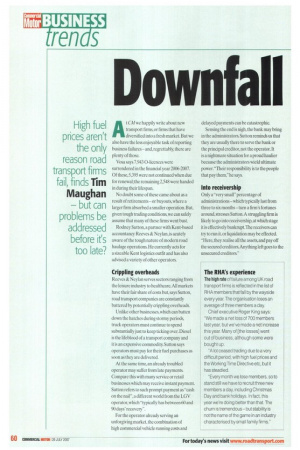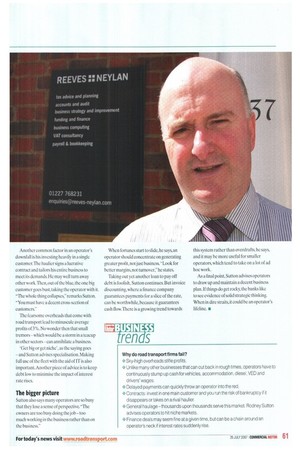Downfa
Page 60

Page 61

If you've noticed an error in this article please click here to report it so we can fix it.
A, CM we happily write about new transport firms, or firms that have diversified into a fresh market. But we also have the less enjoyable task of reporting business failuresand, regrettably, there are plenty of those.
Vosa says 7,943 0-licences were surrendered in the financial year 2006-2007. Of these,5,395 were not continued when due for renewal; the remaining 2,548 were handed in during their lifespan.
No doubt some of these came about as a result of retirementsor buyouts, where a larger firm absorbed a smaller operation. But, given tough trading conditions, we can safely assume that many of these firms went bust.
Rodney Sutton, a partner with Kent-based accountancy Reeves & Neylan, is acutely aware of the tough nature of modern road haulage operations. He currently acts for a sizeable Kent logistics outfit and has also advised a variety of other operators.
Crippling overheads
Reeves Sz Neylan serves sectors ranging from the leisure industry to healthcare.All markets have their fair share of costs but, says Sutton, road transport companies are constantly battered by potentially crippling overheads.
Unlike other businesses, which can batten down the hatches during stormy periods, truck operators must continue to spend substantially just to keep ticking over. Diesel is the lifeblood of a transport company and it is an expensive commodity. Sutton says operators must pay for their fuel purchases as soon as they are delivered.
At the same time, an already troubled operator may suffer from late payments. Compare this with many service or retail businesses which may receive instant payment. Sutton refers to such prompt payment as "cash on the nail", a different world from the LGV operator, which -typically has between 60 and 90 days' recovery".
For the operator already serving an unforgiving market, the combination of high commercial vehicle running costs and delayed payments can be catastrophic.
Sensing the end is nigh, the bank may bring in the administrators. Sutton reminds us that they are usually there to serve the bank or the principal creditor, not the operator. It is a nightmare situation for a proud haulier because the administrators wield ultimate power."Their responsibility is to the people that pay them," he says.
Into receivership
Only a "very small" percentage of administrations which typically last from three to six months turn a firm's fortunes around, stresses Sutton.A struggling firm is likely logo into receivership, at which stage it is effectively bankrupt.The receivers can try to run it, or liquidation may be effected. "Here, they realise all the assets, and pay off the secured creditors. Anything left goes to the unsecured creditors."
The RHA's experience
The high rate of failure among UK road transport firms is reflected in the list of RHA members that fall by the wayside every year. The organisation loses an average of three members a day.
Chief executive Roger King says: We made a net loss of 700 members last year, but we've made a net increase this year. Many of [the losses] went out of business, although some were bought up.
"A lot ceased trading due to a very difficult period, with high fuel prices and the Working Time Directive etc, but it has steadied.
"Every month we lose members, so to stand still we have to recruit three new members a day, incluthng Christmas Day and bank holidays. in fact, this year we're doing better than that. The churn is tremendous-but stability is not the name of the game in an industry characterised by small family firms." Another common factor in an operator's downfall is his investing heavily in a single customer.The haulier signs a lucrative contract and tailors his entire business to meet its demands. He may well turn away other work.Then, out of the blue, the one big customer goes bust, taking the operator with it. "The whole thing collapses," remarks Sutton. "You must have a decent cross-section of customers."
The fearsome overheads that come with road transport lead to minuscule average profits of 3%. No wonder then that small tremorswhich would be a storm in a teacup in other sectorscan annihilate a business.
'Get big or get niche', as the saying goes and Sutton advises specialisation. Making full use of the fleet with the aid of IT is also important. Another piece of advice is to keep debt low to minimise the impact of interest rate rises.
The bigger picture
Sutton also says many operators are so busy that they lose a sense of perspective."The owners are too busy doing the jobtoo much working in the business rather than on the business." When fortunes start to slide, he says, an operator should concentrate on generating greater profit, not just business. "Look for better margins, not turnover," he states.
Taking out yet another loan to pay off debt is foolish, Sutton continues. I3ut invoice discounting, where a finance company guarantees payments for a slice of the rate, can be worthwhile, because it guarantees cash flow. There is a growing trend towards this system rather than overdrafts, he says, and it may be more useful for smaller operators, which tend to take on a lot of ad hoc work.
As a final point, Sutton advises operators to draw up and maintain a decent business plan. If things do get rocky, the banks like to see evidence of solid strategic thinking. When in dire straits, it could be an operator's lifeline.
























































































































































































